7 Common RV Mistakes to Avoid
Whether you are brand new to RVing or have been at this for years, eventually we all make mistakes. After all, we are just humans.
But we can learn from others so that we can avoid the most common RV mistakes. And yes, yours truly is sometimes as guilty of these mistakes as everyone else. Let’s just hope that nothing bad ever comes when we don’t avoid these mishaps.
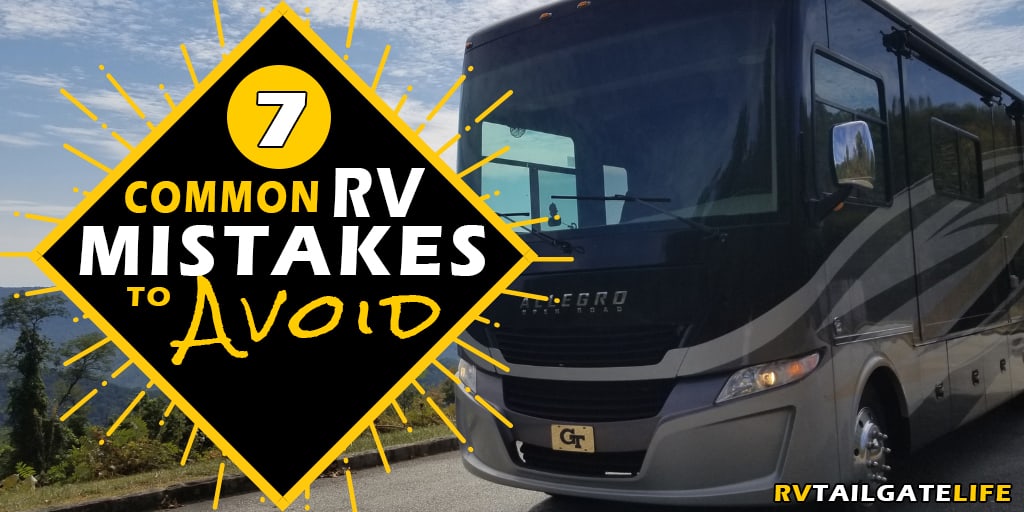
Leaving Your Awning Out
Whether when you go to sleep or when you leave the RV for the ball game, it’s a good idea to pull your RV awning in whenever you leave. It’s a big mistake to leave it out.
When you are away from the RV, you may not have time to get back before a storm hits. A sudden thunderstorm or heavy rain can damage your awning in a big way.
And it doesn’t even have to be raining. Just big wind gusts can do major damage.
I also would not rely on wind sensors on high-end RV motorhomes and fifth wheels. They will bring in the awning when winds pick up, but they may not react in time for sudden gusts. They are a great backup in case you forget, but don’t make it your first line of defense.
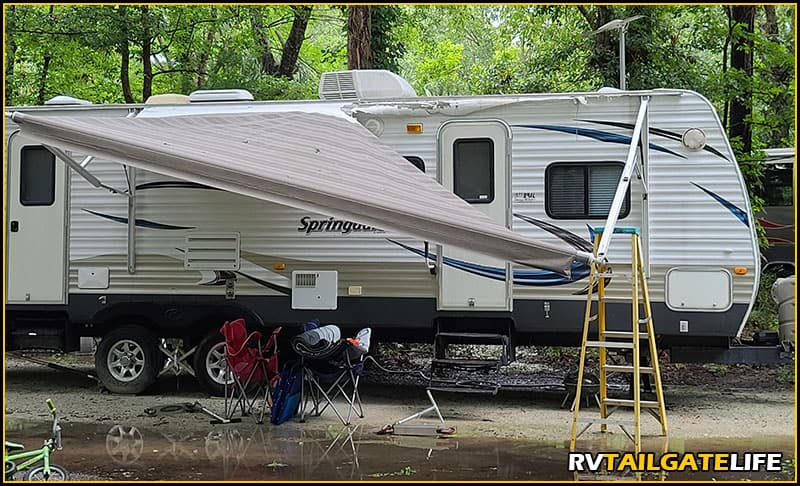
Don’t Forget the Awning when Leaving the Campground
One other time that RVers make a big mistake with the awning – when getting ready to leave the campground.
Even long-time RVers will sometimes make this mistake.
A friend of mine told me that last summer, when he was staying at an RV campground that had only partial hookups, he forgot to bring the awning in when he went to go dump the black tank. He wasn’t leaving the campground, so he didn’t do a full pack up to move. And forgot this very important step.
See Also: What to do in an RV when Severe Weather Threatens
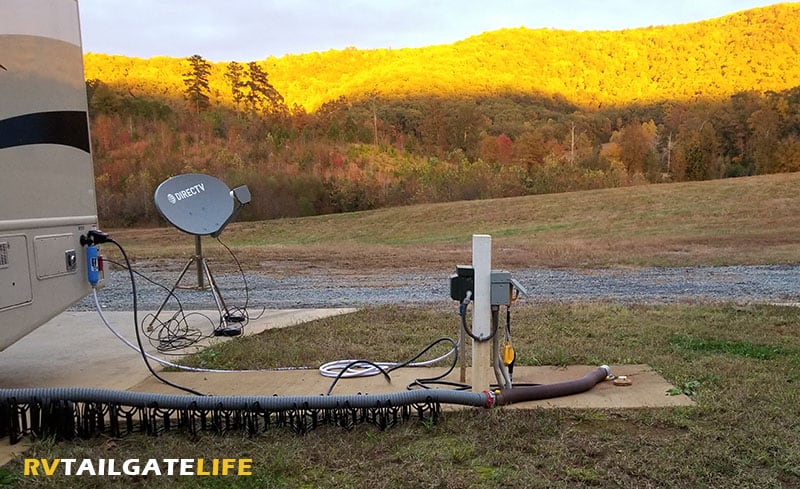
Leaving the Waste Tank Valves Open in RV Campgrounds
Staying in a full hookup RV campground comes with a really big advantage – uninterrupted electric, water, and sewer dumps. But it would be a major mistake to leave the waste tank valves open while you are staying the RV campground.
When you leave the black tank valve open, you allow the liquids to slowly drain out while the more solid parts – the poop and the toilet paper – will collect, forming the dreaded poop pyramid.
Meanwhile, some people will argue that leaving the gray tank open is OK. Personally, I still don’t recommend it. Things can crawl up the pipe and odors can come into your RV.
See Also: Do You Leave Black and Gray Tanks Open or Closed?
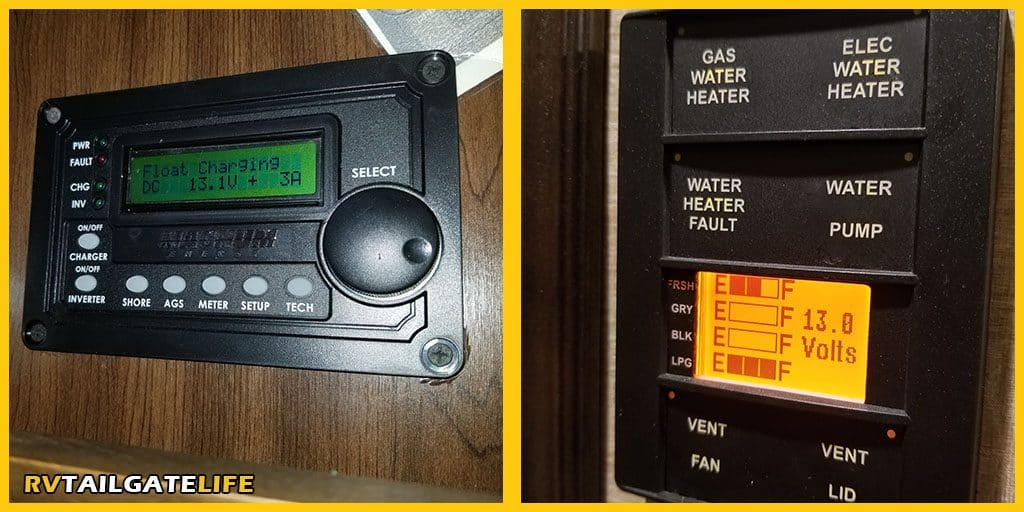
Not Paying Attention to Electrical Issues
Without electrical systems, our RVs would be nothing but really expensive tents. On wheels.
Yet, I often see RV owners making serious mistakes when it comes to their electrical systems.
Not Watering Their Coach Batteries
First, RV owners are not properly maintaining their RV batteries.
I’ve been guilty of this mistake myself – not checking all the cells in the RV battery to make sure that they are at proper levels.
When this happens, you’ll end up with all sorts of issues. Flickering lights, steps not working properly, and then the generator won’t start or will trip the breaker when a short is created.
It also can prematurely kill your RV batteries, causing you to need a pricey replacement.
See Also: Water Your Batteries: RV Battery Maintenance
Overloading the RV Electrical System
Second, RV owners are notorious for trying to run too many things on RV electrical systems.
If you are running on 30 amps, you should really only run 1 air conditioner. You need to upgrade to 50 amps if you want to run a second A/C.
But don’t forget about dryers – both clothes and hair. Or space heaters. Or microwaves. All power hogs that can easily overrun an RV electrical system.
This starts with breakers tripping. But over time, those breakers break themselves. And won’t stay open.
Not Running an RV EMS
Every time I plug in, whether at home or at a campground, I am plugging my RV into a Surge Guard 50 amp Total Electrical Protection to protect my RV from electrical surges.
But that’s not the only thing that the Surge Guard protects my RV from – it also continuously monitors and protects from low and high frequency issues and voltage drops. Before it even connects the RV to the power pole, it is checking for open grounds and open neutrals.
And it comes with a lifetime warranty. So after you are hit with an electrical problem that the Surge Guard was intended to protect from, they will pay for the damage.
Disregarding Proper Tire Maintenance
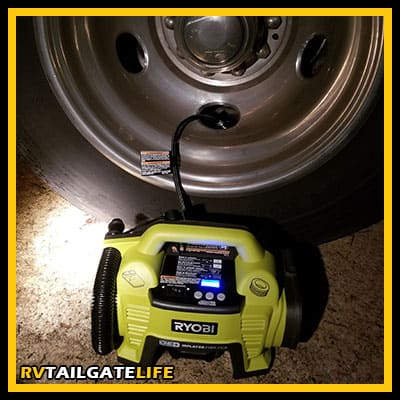
From overloading the RV and carrying too much weight to not checking the tire pressure, many RV tire problems are easily avoidable. Not properly maintaining the RV tires is a major mistake that many RVers make.
And this mistake can be deadly! A tire blowout, while not always avoidable, can be disastrous.
The #1 cause of tire blowout is improper tire maintenance – which includes replacing tires when they age out.
Remember, age is your enemy on tires, not the number of miles you drive. Likely, dry rot is going to kill your tires way before the miles do.
While you should always do a pre-departure check, I recommend a tire pressure monitoring system for keeping an eye on the pressure and temperature while you are underway.
And to have an air compressor on-board that is capable of airing up your RV tires. I found out the hard way that many gas stations do not have air compressors capable of filling up a Big Rig’s tires. They just don’t put out enough PSI. (that’s what she said!)
See Also: TPMS: Protect RV Tires with Tire Pressure Monitoring Systems
Not Making and Sticking to a Plan
I can be as guilty of this RV mistake as anyone else. Probably actually, more prone to it than many others. And that’s not making a plan when traveling in the RV and sticking to that plan.
From unplanned side trips down dusty roads that no RV should travel to not having a good idea of where I’m going to park and sleep the next night on a long road trip, I wing it way too often.
And that can lead to disaster. Fortunately, I’ve avoided it so far.
Have you gone down roads that had too short of bridges to clear? Or maybe just end up in a dead end?
But what happens when you are exhausted and can’t drive anymore but there is nowhere safe to park? Do you really want to be on the side of the road while traffic is flying by? Or what if you park in an area that is “no overnight parking” and you get a rude wake-up call from security or even the police?
See Also: Tips for Overnight RV Parking on a Roadtrip
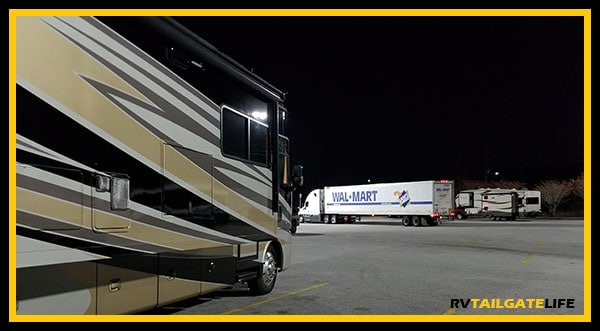
Forgetting The Checklist
Part of the plan every trip is following the checklist. Do you even have a pre-departure checklist?
That pre-departure checklist will include things like checking the awning and slides, picking up all the stuff and securing it, and ensuring that you are in proper shape to depart.
What about a maintenance checklist? Maintenance checklists will help avoid many of the issues – like watering batteries, changing oil, checking the roof – that lead to many of the mistakes highlighted here.
Ignoring Safety Warnings
When you first start RVing, every thing is new. All the beeps and bumps and well, everything pretty much scares you.
But after you’ve got some miles on the tires and hours on the generator, you start to feel like you’ve got it. And that’s when things can get dangerous.
You forget the checklist (see above).
You figure that nothing bad has happened before, so why do you need to put up the Genturi this time? After all, it’s raining and yuck, who wants to deal with that?
Or that pesky beep that signals the carbon monoxide detector has detected something. Or maybe the battery is just low. So you rip it out so you can go back to sleep that night. Or maybe the beep is from the jacks that won’t retract.
Whatever it is, it is really easy to start ignoring safety warnings. And that can be deadly.
So please, do not make the mistake that too many RVers have made and ignored safety warnings. They are there for a reason, after all.
See Also: 8 Annoying Things That Are Actually RV Safety Features
Not Asking for Help
Overall, I’d say that RVers are a pretty self-sufficient bunch. It’s what happens when you hit the road.
You know you are going to run into problems, so you are going to have to find a way to fix them.
But one of the biggest mistakes that RVers make is not knowing when to call in others for help.
Whether that means turning to the RV blogs like this one or YouTube for how-to instructions or asking the RVer next to you at the campground, you should avoid this very common RV mistake.
Remember, most RVers are friendly people. They would love to help you out if they can. Give them the opportunity to pass along some of their lessons to you.
What Other Common RV Mistakes Do RVers Make?
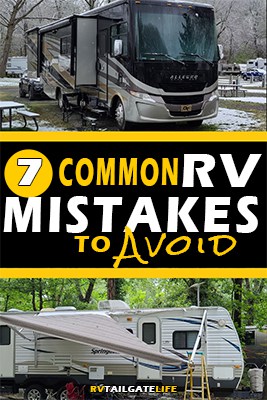
While these are the top seven mistakes that RVers make, I know there are more.
Comment below and let us know what other mistakes we should avoid.
You May Also Like:
How to Save Gas While RVing
RV Insurance Explained
How to Poop in an RV Toilet
Did you like this review of Common RV Mistakes? Pin for later!
